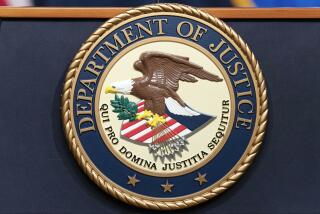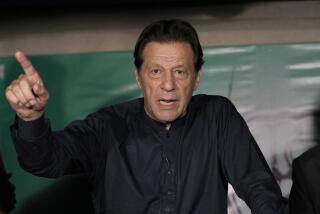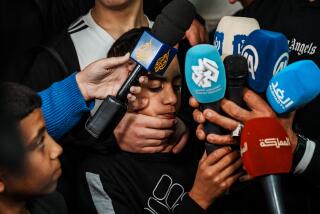Detainee Caught in Backwash of Sept. 11
- Share via
WILMINGTON, Del. — A pizza cook with dreams of becoming a chef, Raza Nasir Khan does not seem to fit the profile of a terrorist.
Federal prosecutors admit that he is not a menace to society, and a federal judge has declared from the bench that “there is nothing here” to connect the 29-year-old Pakistani immigrant with the Sept. 11 attacks on the World Trade Center and the Pentagon, or any other terrorist conspiracy that may be afoot in the U.S.
Indeed, were it not for Sept. 11, Khan most likely never would have been arrested. Yet more than two months after that dreadful morning, he remains behind bars, one of roughly 1,200 detainees scooped up in the massive, often frantic, federal investigation. About half still are in custody.
A cook by trade, a hunter by avocation, a bachelor who strayed from much of his rigorous Muslim training, Khan was tramping alone through the woods near Wilmington, hunting for deer one morning, when he came upon a state Fish and Wildlife agent and asked him for a map.
Khan was carrying a bow and arrow and a global positioning device, a relatively inexpensive electronic compass. It was a week after the suicide attacks, and the forest was near a nuclear power plant.
Alerted by the suspicious wildlife officer, FBI agents visited Khan’s home. There, they found a shotgun, a .22-caliber rifle and a Russian-made semiautomatic pistol. The guns were legal, but it was a felony for Khan to have them because his visa had expired and he was in this country illegally.
Within days, he was arrested and charged as an illegal immigrant in possession of firearms. The judge in the case repeatedly has refused to release him on bail. Prosecutors hope to bring him to trial later this year. A conviction could result in his deportation.
Khan cannot contact his family, even as his ailing parents telephone from Islamabad, seeking advice from his attorney and mercy from the judge. His best friend cannot see him, either, and has spoken to him only once by phone.
Federal officials refuse to provide details about most of those arrested since the attacks. But they have said that only a few are being held on material witness warrants relating to Sept. 11, and that about 200 others were rounded up solely on immigration charges.
That suggests that the vast majority, like Khan, are being detained on unrelated federal, state or local criminal charges.
In most of the cases, the court files have been sealed and hearings are held behind closed doors. Prosecutors and judges say that because the continuing FBI investigation is so complex and grand juries are hearing evidence, information about individual cases must be tightly restricted.
Because Khan was quickly ruled out as a terrorist suspect, his court hearings have been open, and his case record is accessible in the court clerk’s office here. Unlike so many others, his case has a name and a story attached to it.
It was an early fall morning Sept. 19, and Khan was in the Cedar Swamp forest in northeastern Delaware. He apparently was looking for a particular spot to hunt deer when he met the wildlife agent and asked for a map of the woods. The agent was immediately wary. Khan, after all, was obviously a foreigner, and the Salem Nuclear Power Plant lay just across the Delaware River in New Jersey.
The next evening, the FBI was at Khan’s door, and two days later he was in handcuffs. His destination was a federal detention center in nearby Philadelphia.
Even those prosecuting him concede it may have been bad timing more than anything else that led to his detention. Although Khan was among hundreds swept up in those first frenzied days, Richard Andrews, assistant U.S. attorney in Wilmington, said “that doesn’t necessarily mean he had anything to do with Sept. 11.”
“If you ask me,” he added, “Mr. Khan was arrested because of Sept. 11 in the sense that they would not have gone out to interview him but for Sept. 11.”
FBI Used Ruse to Gain Entry, Roommate Says
At Khan’s first hearing, Veronica Hnat, a special agent with the federal Bureau of Alcohol, Tobacco and Firearms, testified that “in light of what happened” at the World Trade Center and the Pentagon, visiting Kahn at home made sense.
Khan’s best friend and roommate, Syed Hassan, said the government overreacted, and that FBI agents used a ruse to get inside their ground-floor apartment near downtown Wilmington.
After knocking on the door the night of Sept. 20, Hassan said the agents announced they were looking for information about Fayez Ahmed, a Saudi Arabian believed to be a hijacker aboard one of the planes that hit the World Trade Center.
“But that was just an excuse,” Hassan said. “It was a better way to enter the house.”
Khan told them they could search the apartment, Hassan said. Inside, they found the guns. Had his visa been in order, Khan would have been in the clear legally. Hassan said the FBI agents told Khan there was a problem. Khan said that he had the guns because he was a hunter, and that he was trying to get a waiver to extend his visa. The agents left without arresting Khan.
For several days, it seemed life had returned to normal. Kahn worked his shifts at Pat’s Pizzeria, where he earned $400 to $500 a week, doubling as a cook and deliveryman. Then, on Sept. 25, he was driving to work when ATF agents stopped him, handcuffed him and took him away. The ATF agents had been notified by the FBI about Khan and the guns.
Back at the apartment, “they took the guns, they took his computer, they took all his paperwork, and bills and stuff like that,” Hassan said. “They took two boxes of his papers.
“They are looking for a clue to anything, and that is right to do with this situation of Sept. 11,” he said. “They have to assure the nation they are doing everything they can, and there is always a possibility of more terrorism in the country.
“But Raza a terrorist? Oh, no.”
Hassan, 23, said he met Khan in Pakistan when they worked together at the Marriott hotel in Islamabad, the capital. Khan was his supervisor, and he was hoping to learn to become a chef.
Hassan immigrated to the United States first, followed by Khan in 1998 on a work visa. Khan took culinary training in Florida, then in April 1999 moved to Wilmington when Hassan told him that a local hotel was planning to renovate its restaurant.
“I was given an opportunity to be a chef in Delaware, and that’s why I came up here,” Khan testified in court Nov. 2.
The job didn’t work out, and eventually his one-year visa expired, he said. He said he tried to have it extended. He wrote then-Sen. William V. Roth Jr. (R-Del.) for help and eventually obtained a waiver extending the visa. When that, too, expired, he contacted the Pakistani Embassy about a second waiver, he said.
“Basically I was just waiting,” Khan said. “I have worked all my life, since 1993. And I am a responsible citizen, as you can see. I have good credit.”
Under cross-examination, Khan admitted that he knew it was illegal to work without a valid visa. But, he said, “they were paying me cash” at the pizzeria.
Hassan also testified at the hearing, saying that ordinarily many other friends would have been in the courtroom to show their support for Kahn.
But, he said, “people think Raza is being detained because he has some kind of connection with terrorism or something like that. So people are afraid, and that’s why they’re not here.”
From Pakistan, Kahn’s parents appealed for their son’s release.
His father, Nasir Mahmood Khan, 64, is a retired army officer in Islamabad who suffers from a heart ailment. Khan’s mother, Farida Nasir Khan, 55, is a diabetic who also “is under a lot of domestic stress,” the parents wrote the court.
Son Is a “Law-Abiding Citizen,” Parents Write
There were two other sons in the family; the eldest is married and in the Pakistani army, and the youngest was a student who was killed earlier this month in a car crash in Pakistan.
“Raza is the only one who supported the family while in Pakistan and then from [the] USA,” the parents said in an affidavit sent to the court. “Thus he is the only bread-earning member of the family, sending a few dollars whenever he possibly can.”
Calling their son a “fine young man and a law-abiding citizen,” they wrote that “since his detention by [the] FBI he has neither been able to talk to his parents nor been able to send any money.”
Keeping him in jail any longer, they said, would be “a most inhumane act. . . . Therefore, for God’s sake and in the name of humanity, have mercy on us and set our child free.”
George Brittingham of Wilmington, who knew Hassan and Khan from the neighborhood, also wrote the court, offering to be responsible for Khan if he were released.
“Raza was a good man; he helped me spiritually and morally,” Brittingham wrote. “It would be such a loss to lose him.”
Khan’s defense attorney, John Malik of Wilmington, said his client is no danger to society and would never flee on bail. But, the lawyer said, “the fact this occurred in the wake of Sept. 11 makes our uphill battle a very steep one.”
Federal Magistrate Mary Pat Thynge, in refusing bail, said it is her policy not to grant bail to people held on gun charges. Even so, she made it a point to say Kahn is not a terrorist.
“I’m not looking at this from the situation of Sept. 11,” she said at a Sept. 28 hearing. “Circumstances that happened on Sept. 11 really are not of any influence here. There is nothing here to suggest [and] there were no indications that this individual was a terrorist. . . . There is no indication to me that there is a terrorism circumstance here.”
At a subsequent hearing, the judge said that Khan’s mother had called her from Islamabad.
“She was very, very upset and very concerned about her son; very concerned about him remaining in jail without bail,” Thynge said. “And what occurred to me when I was talking to her is her fear for what is going on with him and the fact that she was unable to have contact with him. She couldn’t be assured of having direct contact with him to find out how he is doing.”
Hassan said that his friend is holding up fairly well in jail.
“One time, he called me, because they won’t let me see him,” Hassan said. “I told him we all loved him and were praying for his freedom and trying to do the best we could for him. We spoke only a few minutes, and then he was told to put the phone down. He was trying to control himself. But he is not a baby. He will not cry.”
More to Read
Sign up for Essential California
The most important California stories and recommendations in your inbox every morning.
You may occasionally receive promotional content from the Los Angeles Times.











